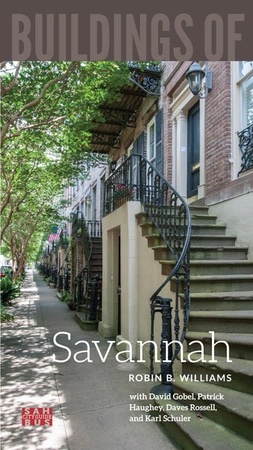
St. John’s was organized in 1840 as part of a new Episcopal diocese. Holding services in a temporary wooden structure beginning in 1841, the wardens and vestry began plans for a new church on the southwest trust lot of Jasper Ward in 1848. Working under Buffalo architect Otis, Calvin Fay (also from Buffalo but by then based in Savannah) supervised the former’s design. With its buttresses, finials, lancet windows, and single central tower and spire, the stucco-covered brick building takes the form of a medieval English parish church and makes evident the rapid spread of the American Ecclesiological movement to the South. Its hammer beam roof is similar to that of St. John’s Church in Buffalo, designed by Otis in 1846 but no longer extant, which was considered the earliest example of such a roof in America. The chancel was added in 1914 and the central panel of the reredos was made by Calvert, Herrick and Riedinger of New York City, following drawings by the rector, William Dakin. The final statues were not completed until the 1980s. The parish house behind the church was built in 1881, but significantly modified when it was transformed for its present use as a Lady Chapel and office space in the 1950s. Across Charlton Street is Cranmer Hall, the educational building constructed in 1953 in a strikingly modernist style with ribbon windows but radically reconfigured to its present Gothic Revival form in 2005 by Greenline Architecture.

